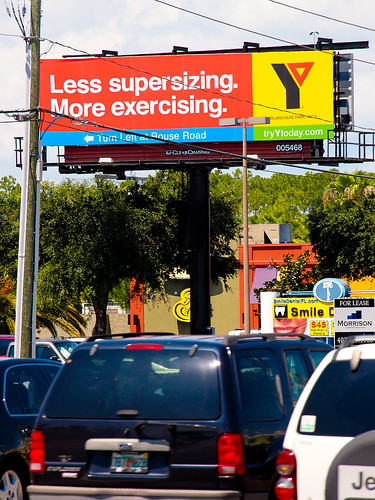Burying the world around us
 Orlando Diary
Orlando DiaryCall me a tree-hugging, left-leaning enviro-kook, whatever will make you feel superior. Starting with this post I'm going to add a new tag and subject; the environment. It'll start with what I shocking about Orlando, and then add links to articles about the Bigger Picture around the world.
Living in Florida since 1984, I've seen too much change; whole swathes of the land mowed down and covered with massive development (parking lots, shopping centers, highways, subdivisions...), all in the name of economic growth and progress.
The photo on the right was taken while out walking to a sub shop close to where I work. It was lunch time. What caught my eye was the contrast of the billboard standing about the trees, trees which had been trimmed to give full exposure to the billboard, with it's admonition to eat less and exercise more, standing over a street full of supersized vehicles with just one driver/vehicle, who probably never gave the billboard and its message a second through.
And it was on a hot day, with the temperatures in the mid-90's and the heat rising up and giving a turbulent shimmer to everything at a distance (zoom in on the photo by selecting the largest size and pixel peep it for a bit to see what I'm talking about). And that's just this one scene, on University near UCF.
And then there's the wider world.
- First the Gulf oil disaster. Mighty oil-eating microbes help clean up the Gulf. "So where did the oil go? ... Some of the oil has sunk into the sediments on the ocean floor. Researchers say that’s where the spill could do the most damage. But according to a report in Wednesday’s New York Times, "federal scientists [have determined] the oil [is] primarily sitting in the water column and not on the sea floor."
Yes. Microbes eating up the oil. Makes you wonder what is going to happen to the rest of the microbial environment. Will we wind up with some kind of killer bloom like red tides? Only time will tell. - Europe is suffering another massive heat wave. Bikinis in Moscow: Europe wilts in heat wave. "A heat wave across much of Europe also is causing crops to wither, forest fires to ignite and roads to melt, while refrigerators and fans are buckling in the searing sun... U.S. climate scientists said Thursday that June was a record-setting month in the temperature department, keeping the planet on a course for a hot year.
Worldwide, the average temperature in June was 61.1 degrees F (16.2 C) — 1.22 degrees F (0.68 C) warmer than average for the month of June, said the National Oceanic and Atmospheric Administration in Washington. This year has had the warmest average temperature for the January-June period on record — 57.5 F (12.2 C).
Russia's worst droughts in a century have destroyed almost 10 million hectares (25 million acres) of crops in central and European areas, authorities said. A state of emergency has been declared in 18 Russian provinces, where fire has engulfed more than 26,000 hectares (64,000 acres) of forest." - Global warming signs unmistakable: report. "A new report by 300 scientists has flagged the past decade as the hottest on record and compiled 10 "unmistakable" indicators that the world is getting warmer.
But the scientists mostly stayed away from discussions about the cause.
The 2009 State of the Climate report released Wednesday by the U.S. National Oceanic and Atmospheric Administration combines data on temperatures, humidity, sea levels, sea ice, glaciers and spring snow cover going back to 1940 or 1850, depending on the type of data."
Yes. Play it safe. Don't upset anyone with the complete truth.
- The Food Chain's Weak Link: Tiny Ocean Plants Dying. "Microscopic plants in the ocean, called phytoplankton, are among the most important creatures on Earth and produce half of the planet's oxygen. But they are in trouble. A new study finds that since 1950, the amount of phytoplankton in the ocean's surface waters — the basis of the ocean's food web — has declined by 40 percent."
- Inventing The Fish: Science And The Collapse Of Ecologies. "Tuna then are both real thing and a metaphor. Literally they are one of the last big public supplies of wild fish left in the world. Metaphorically they are the terminus of an idea: that the ocean is an endless resource where new fish can always be found. In the years to come we can treat tuna as a mile marker as we zoom past on our way towards annihilating the wild ocean or as a stop sign that compels us to turn back and radically reconsider."
- Study: Solar power is cheaper than nuclear. "The report is significant not only because it shows solar to be a cheaper source of energy than nuclear. The results are also important because, despite the Senate’s failure to pass a climate and energy bill this year, taxpayers now bear the burden of putting carbon into the atmosphere through a variety of hidden charges – or externalities, as economists call them. Fossil fuels currently account for 70 percent of the electricity generated in the U.S. annually. (Nuclear generates 20 percent.)
Having dropped below nuclear power, solar power is now one of the least expensive energy sources in America."
As the weeks progress, more to come.
Equipment Used
Olympus E-P2, Digital Zuiko 40-150mm f/4-5.6 w/MMF-2

Comments
Post a Comment
All comments are checked. Comment SPAM will be blocked and deleted.